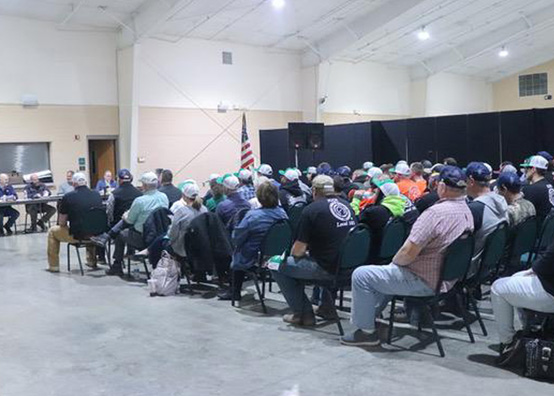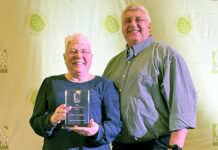Discussion draws large crowd
By HOLLY GASKILL
Following overwhelming public turnout and feedback on the matter, the Wells County Commissioners unanimously delayed a decision for a zoning request from Paddlefish Solar, a solar development planning to settle in parts of Liberty and Chester townships.

Visual boundary lines were drawn with the audience of the commissioners’ meeting Monday night, where nearly 100 people were in attendance. The meeting was held at the Wells County Community Center at the 4-H Fairgrounds in anticipation of a large turnout.
The Wells County Area Plan Commission gave a unanimous “do not pass” recommendation to the commissioners at their hearing on March 7. Paddlefish Solar requested to overlay 49 parcels of agriculturally zoned land with a P-1 district for energy development.
Despite the large attendance at the time, only one person spoke in favor of the development.
“It’s been an interesting week,” Commissioner Jeff Stringer said. “I think I received 12 comments about the whole system. Since the Area Planning Commission (hearing), I can’t even count how many I’ve got — at least 12 to 15 a day, if not more than that, both for and against.”
Commissioners Mike Vanover and Blake Gerber affirmed that sentiment.
The commissioners can override the APC’s ruling and grant the zoning overlay, should they choose to. They have 90 days to decide on the matter or it is automatically rejected.
The commissioners did not provide a timeline for their decision.
“I think we have to do our due diligence,” Gerber said. “My motto has always been ‘do it once and do it right.’ And that means I’m not ready to jump on the bandwagon tonight and go down a path.”
Stringer further noted how much more support the solar project received Monday, where its representation had not been clear at the March 7 hearing. Stringer was one of about a dozen people who spoke against the request at the APC hearing.
Of the over 30 individuals who spoke during public comment Monday, 17 supported the solar development.
Many of those in favor sat in the front rows, often donning bright green and white or navy and white branded hats. Those opposing the request followed in the rows behind, with a handful standing in the back. Each person’s endorsements or arguments against were often met with applause or hollers from their coordinating group, as well as the occasional heckle from the opposition.
Their arguments often fell into similar overlaps — the potential financial benefits or costs, property rights and values, and the future of Wells County.
“The differences in this room cannot be overcome — one side will lose, and one side will win,” said Brandon Harnish, a member of the Wells County Council.
In their March 7 decision, members of the APC said that the solar development appeared incongruent with the established Wells County Vision 2035 Plan, which emphasizes the preservation of an agricultural community.
However, this was disputed by several members of the public, who argued that solar farm represents a new definition of an agricultural community.
“I’m here because I believe solar is an opportunity, that we can provide economic stability as we continue our agricultural heritage and lifestyle both presently and for generations yet to come,” said Claudia Mounsey, representing Mounsey Family Farms, which has signed onto the development. “Agriculture is the backbone of our county’s economy and heritage, and it’s essential to preserve our agricultural resources for future generations. However, I believe that we can find a balance between agricultural productivity and solar energy development.”
“This emerging technology is a natural resource,” said Brad Poper of Bluffton. “The Comprehensive Plan mentions natural resources, and all they’re looking to do is farm a modern, new, emerging technology naturally. So they’re not changing anything, they’re just future farmers.”
However, APC board member John Schuhmacher of Zanesville maintained his position.
“I like to flip on the light switch and have power, but I also like to eat, alright?” Schuhmacher. “My proposal is that if we’re going to have solar panels, put them on areas that have limited agricultural value.”
Multiple residents further mentioned the agricultural productivity of the farm area, including Bluffton real estate agent Jody Holloway.
“I’m not opposed to solar energy, but there’s a place for it, and covering prime farm ground with solar panels is not the place for it,” Holloway said. “Put it on top of the landfill, put it in (a) floodplain area — it should not be covered on prime farm ground, as good as ground as there is in that township.”
Ken Jones of Marion maintained that the matter was about the rights of property owners. “When you do cast your vote, it’s not just about the solar project, it’s about the individual rights of the landowners,” he added.
Harnish later recognized this, noting that arguments about property rights could be made for or against the matter. However, he took issue with the company itself — Paddlefish Solar is partially owned by EDF Renewables, a subsidiary of the French state-owned Électricité de France.
Dale Gearheart of Poneto also highlighted that a portion of those present in support of Paddlefish Solar were from outside of Wells County.
“This decision is not an ideological one, but a political one,” Harnish said. “It isn’t about principle. It’s about power, and whether or not you’re willing to use your power to defend your county and your people against a foreign government-backed green energy project. And that is my one request. That’s what I’m asking you to do. Defend your people.”
Todd Fiechter, a Southern Wells school board member, spoke neither in favor nor against but again affirmed a statement the district has echoed from the beginning — the schools should be considered in any decision.
As public comment closed, Stringer posed final questions to Jesse Laniak, project developer, about the project’s government subsidies. Laniak stated Paddlefish would receive the locally approved 10-year total tax abatement and a federal tax credit, both of which he believed were necessary to the solar development’s start.
“We take this seriously, this is something we don’t take lightly,” Stringer concluded. “This is one that could divide the county, and we’re trying not to do that.”
The commissioners are scheduled to meet next at 5 p.m. Monday, April 1.
holly@news-banner.com



